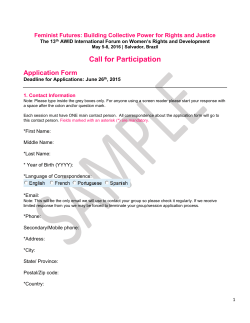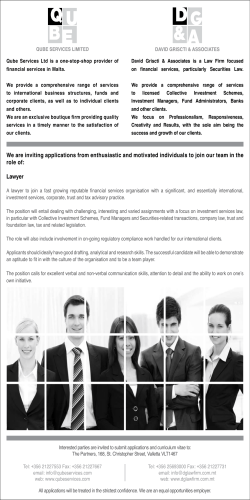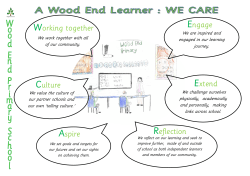
Call for Participation - AWID Forum 2016 An Invitation to Build
13th AWID International Forum on Women’s Rights and Development Salvador, Bahia, Brazil, May 5 to 8, 2016 Call for Participation Apply by June 26, 2015 Feminist Futures: Building Collective Power for Rights and Justice AWID Forum 2016 Call for Participation Feminist Futures: Building Collective Power for Rights and Justice “Another world is not only possible, she is on her way…on a quiet day, if I listen very carefully, I can hear her breathing.” Arundhati Roy, War Talk Join Us! At a time of increased global repression and the attempted silencing of progressive voices, the AWID 2016 Forum is a space for re-imagining and co-creation. This invitation is for you, those who believe in futures free from gendered oppressions, the realization of full rights for people and planet, and self-determination from the body to the nation. We are living through times of unprecedented repression and violence. Most targeted are those who seek to challenge discrimination, inequality and injustice; who work to transform oppressive power structures; who assert their human rights; and who mobilize to protect people and the planet. Attacks on women and other activists and human rights defenders have become particularly violent and widespread. CALL FOR PARTICIPATION Even as we see the rise of new forces of oppression, however, there are growing cracks in old systems of power – often thanks to the impact of resistance by our own movements. These cracks create an opportunity – despite the threats – to nurture new futures based on our own visions of just societies, just relationships, and a healthy Mother Earth. The crises and opportunities facing us mean we need to rethink our responses. It is time to move beyond our customary silos of issues, sectors, locations and identities to create powerful new alliances. Alliances that can transform our diverse sites of activism into powerful interconnected webs of vision and action. Only then can we hope to tap into existing opportunities and turn back the forces Feminist Futures: Building Collective Power for Rights and Justice 2 of oppression that diminish and destroy our rights, our lives, and our planet every day. The 2016 AWID Forum is a space for progressive feminist voices and our allies to imagine futures free from gendered oppressions, racial, ethnic, and economic injustice, environmental degradation, and war and violence, to renew solidarities and advance concrete joint action agendas. It is a space for all who believe in the values of dignity, rights and justice for people and the planet to join in a creative disruption of the dominance and oppression that has sought to silence alternatives. And it is a space where the ideas and experiences of diverse voices and movements will converge to examine the lessons of the past, conjure fresh perspectives and daring ideas, and explore new ways of working together that move us beyond our existing silos and build our collective power. The goals of the AWID Forum 2016 are to: 1. Celebrate the gains of the past 20 years by diverse social movements and critically analyze the lessons we can carry forward; 2. Assess our current reality in the full diversity of our contexts, to locate opportunities for advancing the rights of women and other oppressed people, as well as the threats and challenges – both new and old – confronting us today; 3. Explore strategies for mobilizing greater solidarity and collective power across diverse movements to push back the forces of oppression and tap into existing opportunities to advance shared visions for a just world; 4. Inspire, energize and renew strength and purpose among activists and advocates from diverse locations and movements. CALL FOR PARTICIPATION Feminist Futures: Building Collective Power for Rights and Justice 3 The Urgency of the Times: Our World Today Peoples’ claims and aspirations for justice, equality, freedom and rights have existed throughout time and across geographies. These claims spurred resistance to dictatorship, colonialism and enslavement; they sparked subversion to patriarchy and systems of class and caste exploitation, long before they were enshrined in legal doctrines. Rights continue to evolve and are contested both within official policy frameworks as well as in the struggles and demands of social movements. The Universal Declaration of Human Rights (UDHR) in 1948 ushered in the international human rights system and enhanced global recognition of the indivisibility and universality of human rights, with the State as the primary duty bearer to fulfill, respect and protect these rights. Over the past fifty years, feminist and other progressive social movements have expanded the breadth and depth of formally recognized rights to address the claims of people facing particular forms of oppression and in response to rapidly changing realities in the world. The rallying demand of “women’s rights are human rights” ensured that the 1990s became a turning point for both women’s rights movements and for the human rights framework and centered the obligation for every society to protect, fulfill and promote the rights of women in their diversities. Since then, significant victories have been won in law and practice for women in various contexts on issues including violence against women, sexual and reproductive rights, education and the right to participation. CALL FOR PARTICIPATION At the same time, feminist frameworks have themselves been enriched by other movements for transformation, including, the trans*, intersex and gender non-conforming activists who have pushed feminism beyond binary notions of gender and gender oppression, and the Black, Indigenous and Dalit struggles which pushed feminist movements to go beyond single-issue struggles to recognize the intersections of race, ethnicity, class and caste privileges. During the same half century, the world has undergone significant shifts: from a period of direct colonialism to the promises of politically independent nations; from cold war dictatorships and proxy wars to the rise of peoples’ experimentations in democratization. At best, decolonization has been incomplete, and at worst, it has morphed into economic, political and social patronage or manipulation of colonized nations. At the same time, there have been continued and new acts of annexation and occupation such as those in Western Sahara, Palestine and Ukraine. The dominant economic paradigm, grounded in the legitimization of market-based development, privatization and liberalization, has entrenched inequalities across and within States. New forms of colonialism have emerged that include land and natural resource grabs, with devastating effects on the lives of Black and Indigenous, peasant, rural and impoverished peoples and the protection of the Earth. The exploitation of resources and grabbing of land by corporate interests and the Feminist Futures: Building Collective Power for Rights and Justice 4 commodification and corporatization of our food systems and the commons is creating a massive crisis of people and planet that is also clearly exacerbated by the impacts of climate change. Oppression based on race and ethnicity continues unabated and takes old and new forms within this enduring system of white supremacy, heteropatriarchy, ableism and capitalism that affect all oppressed peoples. Unprecedented technological and scientific advances have increased the possibilities of global wellbeing and interconnection. Yet technology has simultaneously increased the surveillance apparatus of state security agencies and corporations, making repression both financially profitable and easier than ever before. Worldwide, violence continues unabated. Violence against and attempts to control the bodies of women and queer, lesbian, bisexual, gay, trans* and intersex people is rampant and worsening, as is violence against women human rights defenders. This is accompanied by the spread of militarism, which has gained legitimacy as an ideology and practice to deal with social and political conflict, as has been witnessed in Ukraine, Palestine, Nigeria, Mexico and Syria, to name but a few. The military-industrial-complex – a marriage between war and profit – has been further entrenched and normalized as a result. The new millennium has seen a shifting of State power, and a growing lack of State accountability. There has been an undisputed rise of global corporate power and capitalism without borders. In the North and the South, corporate interests have significantly influenced the role the State has played in protecting human rights and women’s human rights. Similarly the United Nations continues to be important in building international consensus on development, rights and justice, as with the post-2015 development agenda and the Sustainable Development Goals, but CALL FOR PARTICIPATION remains weak in holding States accountable to their commitments and obligations. Moreover, with the corporate sector increasingly financing development and the United Nations itself, it remains to be seen whether global governance can be independent from its patrons. Meanwhile, in some contexts, criminal networks and other non-state actors are increasing in power, or there is active collusion between State actors and criminal networks, in what are now termed narco-States or mafiocracies. This has increased the levels of impunity and widespread violence, undermining and seriously challenging State power and the work of diverse feminist and human rights organizations and movements. There has also been a rise of fascisms and fundamentalisms that use justifications of religion, tradition, culture and sovereignty in an attempt to annihilate diverse identities and enforce gendered patriarchal norms. These actors have ascended in the religious, political and economic power structures within countries. In multilateral processes at regional and global levels as well, fundamentalists and their supporters have been successfully advancing their agendas, reviving arguments based on cultural relativism, undermining existing human rights agreements as well as basic civil and political rights, with particular impact on women’s human rights and the rights of the oppressed. Against this backdrop, ‘women and girls’ are central to development debates and visible in mainstream media and institutions to a previously unprecedented degree, presenting both opportunities and challenges. Commitments by new actors in development and philanthropy, such as the corporate sector, may not include a rights-based perspective or have women’s rights organizations at the forefront. Engaging with the ‘women and girls’ phenomenon is as tricky as it is necessary. Feminist Futures: Building Collective Power for Rights and Justice 5 The State of Our Organizing These agendas have not, however, advanced without resistance. Progressive forces have used diverse rights, justice, equity, freedom and self-determination frameworks to contribute to building just communities, societies and worlds. More recently, rights and justice frameworks are being contested in new sites of struggle such as the internet; in relation to duty bearers, like corporations; and from the perspective of claims, like the rights of Mother Earth, to meet the challenges of the day. On the ground, progressive social movements have been organizing to resist and respond to these trends and challenges. They have continued to press for the advancement of human rights and for transformation of the structures of power that sustain inequalities and devastate our planet. In the last decade alone, new narratives of freedom and liberation have been written by ordinary people, outside of the halls of global policy making spaces, in streets and in homes where people are shaping new destinies, against and despite the odds. Hundreds of thousands have mobilized on the streets, and through cyber communities, to rapidly bring people together, share information and denounce abuses. Others have pursued strategies to build alternatives that exist either within or outside of existing structures such as Buen Vivir CALL FOR PARTICIPATION in Bolivia, Indigenous peoples’ self determined development and autonomy processes, and cooperative economic efforts in Greece, Spain and Black communities of the United States. Still other movements are attempting to bring about changes from within, by taking State office and contributing to international policy-making. The silo-ization of struggles, however, has fragmented social movements, while anti-rights and anti-feminist groups have coopted, manipulated and instrumentalized human rights discourses. But in an increasingly connected world, the potential for collective action across diverse forms of organizing has dramatically grown. Rights and justice activists are increasingly working across issues and movements to advance shared agendas, and it is these examples of diverse coalitions that we need to strengthen and multiply. At this historical moment, we have a shared responsibility to disrupt and transform current power structures to advance rights and justice. The AWID 2016 Forum is about moving beyond our silos of issues, sectors, locations and identities with the understanding that none of us are free, until all of us are free. Together we can create new futures. The time is now! Feminist Futures: Building Collective Power for Rights and Justice 6 Guiding Questions for Session Proposals “There is no such thing as a single-issue struggle, because we do not live single-issue lives.” Audre Lorde, Sister Outsider Please frame your session proposals around any or several of the following guiding questions, rooting them in the specific contexts, movements, constituencies or issues that you work with and for: 1. Our gains & learning: What have been some of the main gains for the rights of women and other oppressed people in your regional or national or local context in the past two decades? What strategies – particularly cross-issue or cross-movement solidarity and action – made these gains possible? What were some of the challenges experienced in the cross-movement or cross-issue work done? Have these gains remained in place or are they being eroded? What do we need to do differently to protect them? 2. Our current realities: What is the nature of the current reality in which struggles for rights and justice are taking place in your regional or national or local context? In what ways are old threats to rights and justice changing, consolidating, or expanding? What are some of the new opportunities and threats to advancing rights and justice? Who are the new and old actors impacting these struggles? What kinds of responses do these realities demand from us? How do CALL FOR PARTICIPATION we construct these responses in new ways that strengthen our collective power? 3. Institutions and mechanisms: What is happening to the institutions and mechanisms to secure rights and justice for people and the planet that were created over the past few decades by state and multilateral agencies as well as by progressive social movements? Where and how are they responding effectively to both new and old violations and violators? Where and how are they falling short? What new institutions and mechanisms do we need to create or engage with in the light of current realities? What will it take to bring these into being? 4. Our visions: What are the visions of rights and justice, a healthy society and a healthy planet that have underpinned your organizing? Are these visions still relevant and adequate? What new visions for equality, rights and justice are emerging from your experiences of organizing and from the new opportunities and threats in your contexts? How can we build new visions that are not shackled by the frameworks of the past but respond to their lessons? What are the principles and goals of these new visions? 5. Our collective power: What kinds of collective power and action do these new visions demand of us? Where are the opportunities for creative disruption Feminist Futures: Building Collective Power for Rights and Justice 7 and radical transformation? Can they be achieved by our existing organizing or do they demand new formations that do not currently exist? How can existing opportunities be tapped to build stronger alliances for working together across movements? What are the key alliances we need to build – across our boundaries – to increase our collective power? How do we build these relationships? What are the hurdles we must cross? What are new agendas for collective action in these critical times? How to Submit Your Application: Online We strongly encourage you to fill out our online application form at http://forum2016.awid.org. Once you have submitted your proposal you will receive login information and will be able to return to your submission and make changes and/or additions/corrections until the call closes. Email If you would prefer to complete your application via email, please contact the Forum team at [email protected] to request a word application. Please note you will not be able to make any changes or additions to any applications sent via email. Incomplete applications will not be considered. You can expect to hear back from us with the proposal selection results by September 2015. Thank you for your interest in the AWID Forum. CALL FOR PARTICIPATION Feminist Futures: Building Collective Power for Rights and Justice 8
© Copyright 2026










